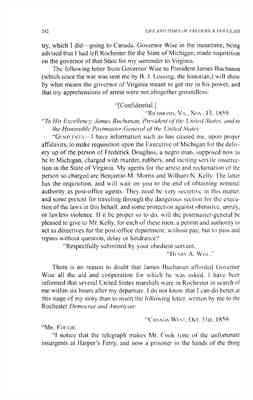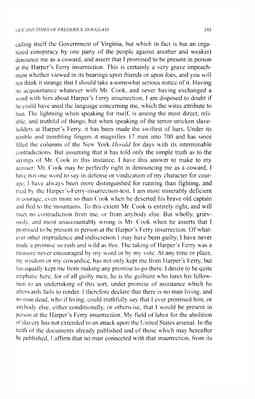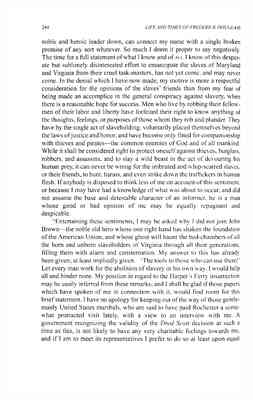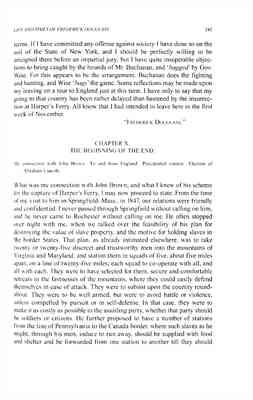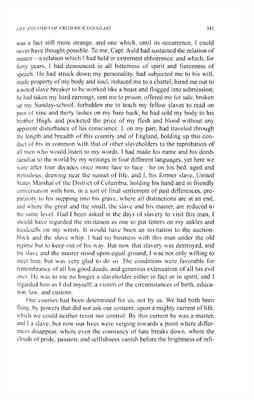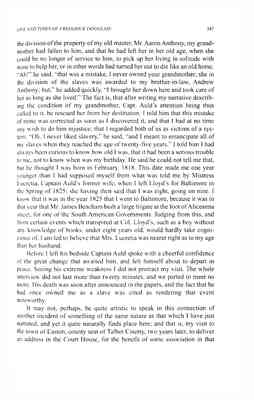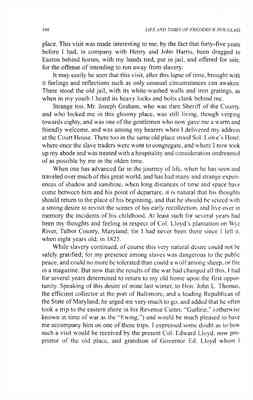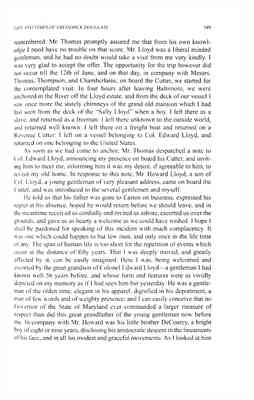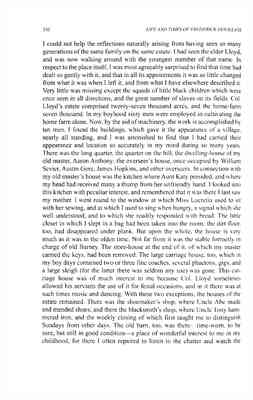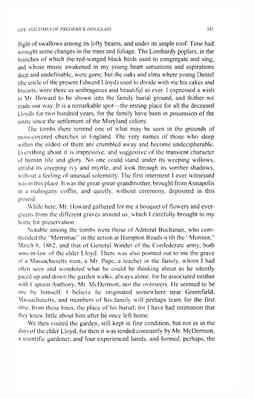Pages That Need Review
Life and Times, Second Part
90
242 LIFE AND TIMES OF FREDERICK DOUGLASS
try, which I did — going to Canada. Governor Wise in the meantime, being advised that I had left Rochester for the State of Michigan, made requisition on the governor of that State for my surrender to Virginia.
The following letter from Governor Wise to President James Buchanan (which since the war was sent me by B. J. Lossing, the historian,) will show by what means the governor of Virginia meant to get me in his power, and that my apprehensions of arrest were not altogether groundless:
"[Confidential.]
"RICHMOND, VA., NOV. 13, 1859.
''To His Excellency, James Buchanan, President of the United States, and to the Honorable Postmaster-General of the United States:
"GENTLEMEN — I have infomation such as has caused me, upon proper affidavits, to make requisition upon the Executive of Michigan for the delivery up of the person of Frederick Douglass, a negro man, supposed now to be in Michigan, charged with murder, robbery, and inciting servile insurrection in the State of Virginia. My agents for the arrest and reclamation of the person so charged are Benjamin M. Morris and William N. Kelly. The latter has the requisition, and will wait on you to the end of obtaining nominal authority as post-office agents. They need be very secreti,e in this matter. and some pretext for traveling through the dangerous section for the execution of the laws in this behalf, and some protection against obtrusive, unruly, or lawless violence. If it be proper so to do, will the postmaster-general be pleased to give to Mr. Kelly, for each of these men, a permit and authority to act as detectives for the post-office department, without pay, but to pass and repass without question, delay or hindrance?
"Respectfully submitted by your obedient servant.
"HENRY A. WISE."
There is no reason to doubt that James Buchanan afforded Governor Wise all the aid and cooperation for which he was asked. I have been informed that several United States marshals were in Rochester in search of me within six hours after my departure. I do not know that I can do better at this stage of my story than to insert the following letter, written by me to the Rochester Democrat and American:
"CANADA WEST, Oct. 31st, 1859.
"MR. EDITOR:
"I notice that the telegraph makes Mr. Cook (one of the unfortunate insurgents at Harper's Ferry, and now a prisoner in the hands of the thing
91
LIFE AND TIMES OF FREDERICK DOUGLASS 243
calling itself the Government of Virginia, but which in fact is but an organized conspiracy by one party of the people against another and weaker) denounce me as a coward, and assert that I promised to be present in person at the Harper's Ferry insurrection. This is certainly a very grave impeachment whether viewed in its bearings upon friends or upon foes, and you will not think it strange that I should take a somewhat serious notice of it. Having no acquaintance whatever with Mr. Cook, and never having exchanged a word with him about Harper's Ferry insurrection, I am disposed to doubt if he could have used the language concerning me, which the wires attribute to him. The lightning when speaking for itself, is among the most direct, reliable, and truthful of things; but when speaking of the terror-stricken slaveholders at Harper's Ferry, it has been made the swiftest of liars. Under its nimble and trembling fingers it magnifies 17 men into 700 and has since filled the columns of the New York Herald for days with its interminable contradictions. But assuming that it has told only the simple truth as to the sayings of Mr. Cook in this instance. I have this answer to make to my accuser: Mr. Cook may be perfectly right in denouncing me as a coward; I have not one word to say in defense or vindication of my character for courage; I have always been more distinguished for running than fighting, and tried by the Harper's-Ferry-insurrection-test. I am most miserably deficient in courage, even more so than Cook when he deserted his brave old captain and fled to the mountains. To this extent Mr. Cook is entirely right, and will meet no contradiction from me, or from anybody else. But wholly, grievously, and most unaccountably wrong is Mr. Cook when he asserts that I promised to be present in person at the Harper's Ferry insurrection. Of whatever other imprudence and indiscretion I may have been guilty. I have never made a promise so rash and wild as this. The taking of Harper's Ferry was a measure never encouraged by my word or by my vote. At any time or place, my wisdom or my cowardice, has not only kept me from Harper's Ferry, but has equally kept me from making any promise to go there. I desire to be quite emphatic here, for of all guilty men, he is the guiltiest who lures his fellowmen to an undertaking of this sort, under promise of assistance which he afterwards fails to render. I therefore declare that there is no man living, and no man dead, who if living, could truthfully say that I ever promised him, or anybody else, either conditionally, or otherwise, that I would be present in person at the Harper's Ferry insurrection. My field of labor for the abolition of slavery has not extended to an attack upon the United States arsenal. In the teeth of the documents already published and of those which may hereafter be published. I affirm that no man connected with that insurrection, from its
92
244 LIFE AND TIMES OF FREDERICK DOUGLASS
noble and heroic leader down, can connect my name with a single broken promise of any sort whatever. So much I deem it proper to say negatively. The time for a full statement of what I know and of ALL I know of this desperate but sublimely disinterested effort to emancipate the slaves of Maryland and Virginia from their cruel task-masters, has not yet come, and may never come. In the denial which I have now made, my motive is more a respectful consideration for the opinions of the slaves' friends than from my fear of being made an accomplice in the general conspiracy against slavery, when there is a reasonable hope for success. Men who live by robbing their fellowmen of their labor and liberty have forfeited their right to know anything of the thoughts, feelings, or purposes of those whom they rob and plunder. They have by the single act of slaveholding, voluntarily placed themselves beyond the laws of justice and honor, and have become only fitted for companionship with thieves and pirates — the common enemies of God and of all mankind. While it shall be considered right to protect oneself against thieves, burglars, robbers, and assassins, and to slay a wild beast in the act of devouring his human prey, it can never be wrong for the imbruted and whip-scarred slaves, or their friends, to hunt, harass, and even strike down the tratlickers in human flesh. If anybody is disposed to think less of me on account of this sentiment, or because I may have had a knowledge of what was about to occur, and did not assume the base and detestable character of an informer, he is a man whose good or bad opinion of me may be equally repugnant and despicable.
"Entertaining these sentiments, I may be asked why I did not join John Brown —the noble old hero whose one right hand has shaken the foundation of the American Union, and whose ghost will haunt the bed-chambers of all the born and unborn slaveholders of Virginia through all their generations, filling them with alarm and consternation. My answer to this has already been given; at least impliedly given — 'The tools to those who can use them!' Let every man work for the abolition of slavery in his own way. I would help all and hinder none. My position in regard to the Harper's Ferry insurrection may be easily inferred from these remarks, and I shall be glad if those papers which have spoken of me in connection with it, would find room for this brief statement. I have no apology for keeping out oft he way of those gentlemanly United States marshals, who are said to have paid Rochester a somewhat protracted visit lately, with a view to an interview with me. A government recognizing the validity of the Dred Scott decision at such a time as this, is not likely to have any very charitable feelings towards me, and if I am to meet its representatives I prefer to do so at least upon equal
93
LIFE AND TIMES OF FREDERICK DOUGLASS 245
terms. If I have committed any offense against society I have done so on the soil of the State of New York, and I should be perfectly willing to be arraigned there before an impartial jury; but I have quite insuperable objections to being caught by the hounds of Mr. Buchanan, and 'bagged' by Gov. Wise. For this appears to be the arrangement. Buchanan does the fighting and hunting, and Wise 'bags' the game. Some reflections may be made upon my leaving on a tour to England just at this time. I have only to say that my going to that country has been rather delayed than hastened by the insurrection at Harper's Ferry. All know that I had intended to leave here in the first week of November.
"FREDERICK DOUGLASS."
CHAPTER X.
THE BEGINNING OF THE END.
My connection with John Brown — To and from England — Presidential contest —Election of Abraham Lincoln.
What was my connection with John Brown, and what I knew of his scheme for the capture of Harper's Ferry, I may now proceed to state. From the time or my visit to him in Springfield, Mass., in 1847, our relations were friendly and confidential. I never passed through Springfield without calling on him, and he never came to Rochester without calling on me. He often stopped over night with me when we talked over the feasibility of his plan for destroying the value of slave property, and the motive for holding slaves in the border States. That plan, as already intimated elsewhere, was to take twenty or twenty-five discreet and trustworthy men into the mountains of Virginia and Maryland, and station them in squads of five, about five miles apart, on a line of twenty-five miles; each squad to co-operate with all, and all with each. They were to have selected for them, secure and comfortable retreats in the fastnesses of the mountains, where they could easily defend themselves in case of attack. They were to subsist upon the country roundabout. They were to be well armed, but were to avoid battle or violence, unless compelled hy pursuit or in self-defense. In that case, they were to make it as costly as possible to the assailing party, whether that party should be soldiers or citizens. He further proposed to have a number of stations from the line of Pennsylvania to the Canada border, where such slaves as he might, through his men, induce to run away, should be supplied with food and shelter and be forwarded from one station to another till they should
193
LIFE: AND TIMES OF FREDERICK DOUGLASS
345
was a fact still more strange, and one which, until its occurrence, I could never have thought possible. To me, Capt. Auld had sustained the relation of master~a relation which I had held in extremest abhorrence, and which, for forty years, I had denounced in all bitterness of spirit and fierceness of speech. He had struck down my personality, had subjected me to his will, made property of my body and soul, reduced me to a chattel, hired me out to a noted slave breaker to be worked like a beast and flogged into submission; he had taken my hard earnings, sent me to prison, offered me for sale, broken up my Sunday-school. forbidden me to teach my fellow slaves to read on pain of nine and thirty lashes on my bare back: he had sold my body to his brother Hugh. and pocketed the price of my flesh and blood without any apparent disturbance of his conscience. I. on my part. had traveled through kngth and breadth ofthis country and of England, holding up this conduct of his in common with that of other slaveholders to the reprobation of all men who would listen to my words. I had made his name and his deeds familiar to the world by my writings in four different languages, yet here were after four decades once more face to face---
11 ere a Iler four decades once more face to face~he on his bed. aged and tremulous. drawing near the sunset of life. and I. his former slave, United States :\1arshal of the District of Columbia. holding his hand and in friendly cnn1 ersation " ·ith him. in a sort of final settlement of past differences, preparatory to his stepping into his grave. where all distinctions are at an end, and where the great and the small. the sla1e and his master. are reduced to thl' same le1cl. Had I been asked in the days of sla1ery to visit this man, I should have regarded the invitation as one to put fetters on my ankles and handcuffs on my wrists. It would ha,·e been an invitation to the auctionblock and the slave 11 hip. I had no business with this man under the old regime but to keep out of his 11ay. But now that slal'ery was destroyed, and the sl,m.: and the master stood upon equal ground. I was not only willing to meet h11n. but was wry glad to do so . The conditions were favorable for remembrance of all his good deeds. and generous extenuation of all his evil ones. I le was to me no longer a sla, eholder either in fact or in spirit, and I regarded him as I did myself: a victim of the circumstances of birth, education. law. and custom. Our courses had been detennined for us. not by us. We had both been flung. by powers that did not ask our consent. upon a mighty current of life. 11 h1ch we could neither resist nor control. By this current he was a master. and I a slave: but now our lives were verging towards a point where differences disappear. where even the constancy of hate breaks down. where the clouds of pride. passion. and selfishness vanish before the brightness of inti-
195
LIFE AND TIMFS OF FREDERICK DOUGLASS
347
the division of the property of my old master Mr. Aaron Anthony, my grandmother had fallen to him and that he had left her in her old age when she could be no longer of service to him to pick up her living in solitude with none to help her or in other words had turned her out to die like an old horse. "Ah!" he said "that was a mistake I never owned your grandmother; she in the division of the slaves was awarded to my brother-in-law Andrew Anthony; but," he added quickly "I brought her down here and took care of her as long as she lived." The fact is that after writing my narrative describing the condition of my grandmother Capt. Aulds attention being thus called to it he rescued her from her destitution. I told him that this mistake or mine was corrected as soon as I discovered it and that I had at no time any wish to do him injustice; that I regarded both of us as victims of a system. "Oh I never liked slavery" he said, "and I meant to emancipate all of my slaves when they reached the age of twenty-five years." I told him I had always been curious to know how old I was that it had been a serious trouble to me not to know when was my birthday. He said he could not tell me that but he thought I was born in February, 1818. This date made me one year younger than I had supposed myself from what was told me by Mistress Lucretia, Captain Auld's former wife when I left Lloyds for Baltimore in the Spring of 1825: she having then said that I was eight going on nine. I know that it was in the year 1825 that I went to Baltimore, because it was in that year that Mr. James Beacham built a large frigate at the foot of Aliceanna street, for one of the South American Governments. Judging from this and from certain e,ents which transpired at Col. Lloyds. such as a boy without any knowledge of books under eight years old would hardly take cognizance of, I am led to believe that Mrs. Lucretia was nearer right as to my age than her husband.
Before I left his bedside Captain Auld spoke with a cheerful confidence of the great change that awaited him, and felt himself about to depart in peace. Seeing his extreme weakness I did not protract my visit. The whole interview did not last more than twenty minutes and we parted to meet no more. His death was soon after announced in the papers and the fact that he had once owned me as a slave was cited as rendering that event notworthy.
It may not perhaps be quite artistic to speak in this connection of another incident of something of the same nature as that which I have just narrated and yet it quite naturally finds place here; and that is my visit to the town of Eastern county seat of Talbot County two years later to deliver an address in the Court House, for the benefit of some association in that
196
348
LIFE AND TIMES OF FREDERICK DOUGLASS
place. This visit was made interesting to me, by the fact that forty-five years before I had, in company with Henry and John Harris, been dragged to Easton behind horses with my hands tied, put in jail, and offered for sale, for the offense of intending to run away from slavery.
It may easily be seen that this visit, after this lapse of time, brought with it feelings and reflections such as only unusual circumstances can awaken. There stood the old jail, with its white-washed walls and iron gratings, as when in my youth I heard its heavy locks and bolts clank behind me.
Strange too, Mr. Joseph Graham, who was then Sheriff of the County, and who locked me in this gloomy place, was still living, though verging towards eighty, and was one of the gentlemen who now gave me a warm and friendly welcome, and was among my hearers when I delivered my address at the Court House. There too in the same old place stood Sol. Lowe's Hotel, where once the slave traders were wont to congregate, and where I now took up my abode and was treated with a hospitality and consideration undreamed of as possible by me in the olden time.
When one has advanced far in the journey of Iife. when he has seen and traveled over much of this great world, and has had many and strange experiences of shadow and sunshine, when long distances of time and space have come between him and his point of departure, it is natural that his thoughts should return to the place of his beginning, and that he should be seized with a strong desire to revisit the scenes of his early recollection, and live over in memory the incidents of his childhood. At least such for several years had been my thoughts and feeling in respect of Col. Lloyd's plantation on Wye River, Talbot County, Maryland; for I had never been there since I left it, when eight years old, in 1825.
While slavery continued, of course this very natural desire could not be safely gratified; for my presence among slaves was dangerous to the public peace, and could no more be tolerated than could a wolf among sheep. or fire in a magazine. But now that the results of the war had changed all this. I had for several years determined to return to my old home upon the first opportunity. Speaking of this desire of mine last winter, to Hon. John L. Thomas, the efficient collector at the port of Baltimore, and a leading Republican of the State of Maryland, he urged me very much to go. and added that he often took a trip to the eastern shore in his Revenue Cutter, "Guthrie." (otherwise known in time of war as the "Ewing,") and would be much pleased to have me accompany him on one of these trips. I expressed some doubt as to how such a visit would be received by the present Col. Edward Lloyd. now proprietor of the old place, and grandson of Governor Ed. Lloyd whom 1
197
LIFE AND TIMES OF FREDERICK DOUGLASS 349
remembered. Mr. Thomas promptly assured me that from his own knowledge I need have no trouble on that score. Mr. Lloyd was a liberal minded gentleman, and he had no doubt would take a visit from me very kindly. I was very glad to accept the offer. The opportunity for the trip however did not occur till the 12th of June, and on that day, in company with Messrs, Thomas, Thompson, and Chamberlaine, on board the Cutter, we started for the contemplated visit. In four hours after leaving Baltimore, we were anchored in the River off the Lloyd estate, and from the deck of our vessel I saw once more the stately chimneys of the grand old mansion which I had last seen from the deck of the "Sally Lloyd" when a boy. I left there as a slave, and returned as a freeman: I left there unknown to the outside world, and returned well known: I left there on a freight boat and returned on a Revenue Cutter: I left on a vessel belonging to Col. Edward Lloyd, and returned on one belonging to the United States.
As soon as we had come to anchor, Mr. Thomas despatched a note to Col. Edward Lloyd, announcing my presence on board his Cutter, and inviting him to meet me, informing him it was my desire, if agreeable to him, to revisit my old home. In response to this note, Mr. Howard Lloyd, a son of Col. Lloyd, a young gentleman of very pleasant address, came on board the Cutter, and was introduced to the several gentlemen and myself.
He told us that his father was gone to Easton on business, expressed his regret at his absence, hoped he would return before we should leave, and in the meantime received us cordially and invited us ashore, escorted us over the grounds, and gave us as hearty a welcome as we could have wished. I hope I shall be pardoned for speaking of this incident with much complacency. It was one which could happen to but few men, and only once in the life time of any. The span of human lite is too short for the repetition of events which occur at the distance of fifty years. That I was deeply moved, and greatly affected hy it, can be easily imagined. Here I was, being welcomed and escorted by the great grandson of Colonel Edward Lloyd―a gentleman I had known well 56 years before, and whose form and features were as vividly depicted on my memory as if I had seen him but yesterday. He was a gentleman of the olden time, elegant in his apparel, dignified in his deportment, a man of few words and of weighty presence; and I can easily conceive that no Governor of the State of Maryland ever commanded a larger measure of respect than did this great grandfather of the young gentleman now before me. In company with Mr. Howard was his little brother DeCourcy, a bright boy of eight or nine years, disclosing his aristocratic descent in the lineaments of his face, and in all his modest and graceful movements. As I looked at him
198
350 LIFE AND TIMES OF FREDERICK DOUGLASS
I could not help the reflections naturally arising from having seen so many generations of the same family on the same estate. I had seen the elder Lloyd, and was now walking around with the youngest member of that name. In respect to the place itself, I was most agreeably surprised to find that time had dealt so gently with it, and that in all it appointments it was so little changed from what it was when I left it, and from what I have elsewhere described it. Very little was missing except the squads of little black children which were once seen in all directions, and the great number of slaves on its fields. Col. Lloyd's estate comprised twenty-seven thousand acres, and the home-farm seven thousand. In my boyhood sixty men were employed in cultivating the home farm alone. Now, by the aid of machinery, the work is accomplished by ten men. I found the buildings, which gave it the appearance of a village, nearly all standing, and I was astonished to find that I had carried their appearance and location so accurately in my mind during so many years. There was the long quarter, the quarter on the hill, the dwelling-house of my old master, Aaron Anthony; the overseer's house, once occupied by William Sevier, Austin Gore, James Hopkins, and other overseers. In connection with my old master's house was the kitchen where Aunt Katy presided, and where my head had received many a thump from her unfriendly hand. I looked into this kitchen with peculiar interest, and remembered that it was there I last saw my mother. I went round to the window at which Miss Lucretia used to sit with her sewing, and at which I used to sing when hungry, a signal which she well understood, and to which she readily responded with bread. The little closet in which I slept in a bag had been taken into the room; the dirt floor, too, had disappeared under plank. But upon the whole, the house is very much as it was in the olden time. Not far from it was the stable formerly in charge of old Barney. The store-house at the end of it, of which my master carried the keys, had been removed. The large carriage house, too, which in my boy days contained two or three tine coaches, several phaetons, gigs, and a large sleigh (for the latter there was seldom any use) was gone. This carriage house was of much interest to me because Col. Lloyd sometimes allowed his servants the use of it for festal occasions, and in it there was at such times music and dancing. With these two exceptions, the houses of th estate remained. There was the shoemaker's shop, where Uncle Abe made and mended shoes; and there the blacksmith's shop, where Uncle Tony hammered iron, and the weekly closing of which first taught me to distinguish Sundays from other days. The old barn, too, was there- time-worn, to be sure, but still in good condition--a place of wonderful interest to me in my childhood, for there I often repaired to listen to the chatter and watch the
199
LIFE AND TIMES OF FREDERICK DOUGLASS 351
flight of swallows among its lofty beams, and under its ample roof. Time had wrought some changes in the trees and foliage. The Lombardy poplars, in the branches of which the red-winged black birds used to congregate and sing, and whose music awakened in my young heart sensations and aspirations deep and undefinable, were gone; but the oaks and elms where young Daniel (the uncle of the present Edward Lloyd) used to divide with me his cakes and biscuits, were there as umbrageous and beautiful as ever. I expressed a wish to Mr. Howard to be shown into the family burial ground, and thither we made our way. It is a remarkable spot--the resting place for all the deceased Lloyds for two hundred years, for the family have been in possession of the estate since the settlement of the Maryland colony.
The tombs there remind one of what may be seen in the grounds of moss-covered churches in England. The very names of those who sleep within the oldest of them are crumbled away and become undecipherable. Everything about it is impressive, and suggestive of the transient character of human life and glory. No one could stand under its weeping willows amidst its creeping ivy and myrtle, and look through its somber shadows, without a feeling of unusual solemnity. The first interment I ever witnessed was in this place. It was the great-great-grandmother, brought from Annapolis in a mahogany coffin, and quietly, without ceremony, deposited in this ground.
While here, Mr. Howard gathered for me a bouquet of flowers and evergreens from the different graves around us, which I carefully brought to my home for preservation.
Notable among the tombs were those of Admiral Buchanan, who commanded the "Merrimac" in the action at Hampton Roads with the "Monitor," March 8, 1862, and that of General Winder of the Confederate army, both sons-in-law of the cider Lloyd. There was also pointed out to me the grave of a Massachusetts man, a Mr. Page, a teacher in the family, whom I had often seen and wondered what he could be thinking about as he silently paced up and down the garden walks, always alone, for he associated neither with Captain Anthony, Mr. McDermott, nor the overseers. He seemed to be one by himself. I believe he originated somewhere near Greenfield, Massachusetts, and members of his family will perhaps learn for the firs time, from these lines, the place of his burial; for I have had intimation that they knew little about him after he once left home.
We then visited the garden, still kept in fine condition, but not as in the days of the elder Lloyd, for then it was tended constantly by Mr. McDermott, a scientific gardener, and four experienced hands, and formed, perhaps, the
